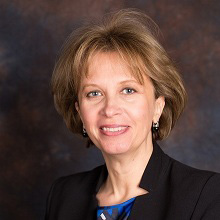2017 Impact Awards
Streamlining Access to Complex Data
George Washington University created a visual, interactive collection of high-level metrics designed for a group of pivotal campus decision-makers: university deans.
Category: Administration
Institution: George Washington University
Project: The Deans' Dashboard
Project lead: Jelena Roljevic, assistant vice president, business intelligence and enterprise information services
Tech lineup: IBM Cognos, Informatica, Tableau
Business intelligence (BI) projects are only worthwhile if users derive tangible value from them. And campus decision-makers don't have the time to wade through complex reports, no matter how relevant the data.
With that in mind, the BI team at George Washington University (DC) tapped into data visualization tools to create a dashboard tailored to the needs of busy college deans. The Dean's Dashboard is a collection of several high-level metrics from different business areas across the university. It is one result of a five-year process of creating an enterprise data warehouse and a culture of data stewardship across the university, as well as the deployment of an agile project management process that fosters incremental improvement.

Project lead Jelena Roljevic
In fact, Jelena Roljevic, assistant vice president for business intelligence and enterprise information services at the university, said agile methodology and BI are a perfect marriage. "Users can rarely tell you their requirements up front with all the details," she said. "We meet with business users to take in prioritized requirements — and two weeks later show them what we were able to develop based on their request. We work back and forth until we have a product. It is the only way I can see analytics being developed."
The Dean's Dashboard was launched in August 2016 after six such two-week agile sprints. It provides real-time, accurate data in an interactive and visual way. To make decisions, deans must draw on and understand information from an ecosystem of databases and repositories across the campus. The visualizations "had to be very clear in what they were saying and we had to devise a capability to allow users to drill down to more detailed dashboards if the deans want to," said Margaret Roldan, principal BI analyst.
The BI team said the dashboard allows deans to access the information they need at a much-reduced cost and time commitment from university support staff, who no longer have to dedicate large portions of their time to collecting and organizing information. These staffers previously spent considerable time manually preparing reports and other information products using tools such as Excel. The early success of the Dean's Dashboard has spawned a complementary Division Dashboard that serves a similar purpose for executive leaders who manage university business units.
Before the Dean's Dashboard could be created, quite a bit of work had to be done. Roljevic launched the BI initiative at GWU in 2012. The goal was to create a process in which dashboards could help faculty and staff groups access and manipulate data in an easy-to-consume way. Software tools used include IBM Cognos, Tableau for building interactive visualizations, and Informatica to help with data quality issues.

GWU's dashboard project led to culture change across the institution.
Among the first steps was creating a Business Intelligence Advisory Committee — a group of senior to mid-level managers from across the university, including some deans, to guide priorities. "We surveyed them asking what data is most important to you; where are the biggest pain points in terms of getting information," Roljevic recalled. They also looked at which data sets were missing from a data warehouse environment. Initially they had information on courses, students and faculty but lacked financial data. "One of the first tasks was to get that data and shape the content that we could push out to executive leadership," she said.
Data stewardship, governance and trust are keys to the process, Roljevic said. "We put data-sharing agreements in place and the data stewards can control it." So if the BI team is asked to build something that uses human resources data, staffers will create a data-sharing request and the steward can approve it or not, or set conditions. That has been helpful as the team approaches more sensitive data sources, such as how students and faculty use access cards as they move around the campus.
The BI team learned a few lessons during development of the Dean's Dashboard. One was that they had to push the information to deans in the form of regular e-mails rather than expecting deans to log in to the Tableau server to look at it. "Our provost is very comfortable with technology and will log in and play with visualizations, but not all deans are like that," Roldan noted.
"This way, they can be kept abreast of changes every Monday morning, filtered for their school," Roljevic said. "Deans can quickly see if employee counts or student admissions are fine, or if something doesn't look right, they can click on the image and explore further."
Another challenge was creating concise views that encapsulated the high-level details deans want to see but that also align with the data reported by executives down the chain. After all, finance and human resources directors rely on more in-depth dashboards of the same data. All the visualizations are working from the same data warehouse and data definitions, Roljevic added, so if a dean wants to explore further, his or her finance director does not have to go to another source to research it or start researching the topic from scratch. They are all acting on identical data.
Another lesson, in tune with the agile mindset, is don't let the perfect be the enemy of the good. The Dean's Dashboard is far from perfect, the team admits. Some areas of information, such as student financial aid and student retention, are not yet available in the university data warehouse. Also, business processes that are unique to a particular school or dean are not included.
The whole process of expanding BI across the university is iterative, Roljevic said. "We are still adding data sources, but we want to give end users resources they can use as we complete them, and not wait for everything to be in a data warehouse. Besides, their appetites and needs change continuously. In agile fashion, we deploy as soon as we have something meaningful for them to use. The Dean's Dashboard continues to evolve as new data sources become available."
Return to Campus Technology Impact Awards Home

